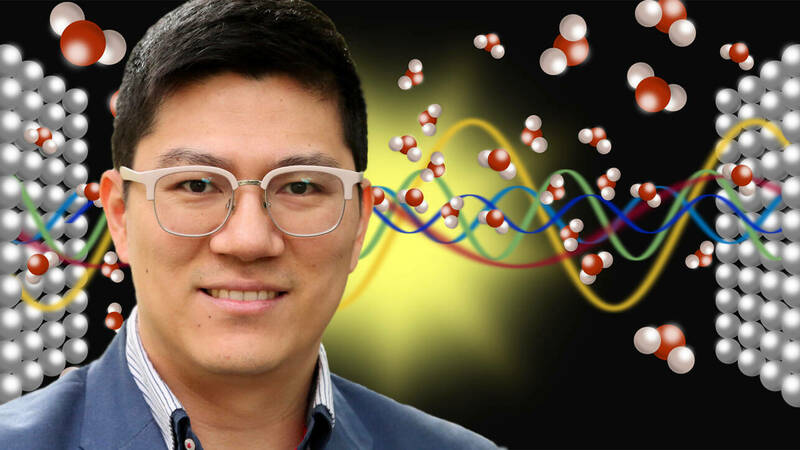
Hsing-Ta Chen
Assistant Professor
- Office
- 373 Nieuwland Science Hall
Notre Dame, IN 46556 - Phone
- +1 574-631-1935
- hchen25@nd.edu
Research Areas
- Inorganic Chemistry
- Physical/Analytical Chemistry
Research Specialties
- Energy
- Materials
- Theory
Prospective Graduate Students
Biography
| Year | Title |
|---|---|
| 2022 | Assistant Professor, University of Notre Dame |
| 2017-2022 | Postdoctoral Researcher, University of Pennsylvania |
| 2016 | Ph.D. in Chemical Physics, Columbia University |
| 2010 | M.S. in Physics, National Taiwan University |
| 2006 | B.S. in Mathematics and Physics, National Taiwan University |
Selected Awards
2016 Sackler Postdoctoral Fellow, Tel Aviv University
2013-2014 Columbia-Upjohn Fellow
2010 Student Thesis Award, Taiwan Physical Society
Research Interests
The Chen research group is broadly interested in the intersection of chemistry, physics, and materials. Research in the Chen group focuses on developing theoretical tools and using high performance computing facilities aimed at excited-state dynamics and light-matter interactions. The systems studied range from plasmonic excitation of metallic clusters, laser-driven non-adiabatic molecular dynamics, and collective optical response of molecular ensembles. These systems are of key importance for understanding many recent experimental advances that cannot be accurately predicted by current theoretical approaches.
Our focus is quantifying electron transfer and energy conversion processes at the interface between molecules and materials strongly interacting with light. We are particularly interested in non-adiabatic dynamics methods (specifically surface hopping) and many-body quantum simulation (for example, quantum Monte Carlo). Our major goal is to develop reliable theoretical models and simulation methods to guide experimental improvements in next-generation photovoltaic cells and facilitate new design principles for electronic nano-devices.
Selected Publications
- Zhou, Z. Y.; Chen, H. T.; Sukharev, M.; Subotnik, J. E. and Nitzan, A. "Nature of Polariton Transport in a Fabry-Perot Cavity" 2024 Physical Review A, 109 (3), 033717. DOI: 10.1103/PhysRevA.109.033717.
- Zhou, Z. Y.; Chen, H. T.; Sukharev, M.; Subotnik, J. E. and Nitzan, A. "On the Nature of Two-Photon Transitions for a Collection of Molecules in a Fabry-Perot Cavity" 2024 Journal of Chemical Physics, 160 (9), 094107. DOI: 10.1063/5.0180910.
- Zhou, Z. Y.; Chen, H. T.; Subotnik, J. E. and Nitzan, A. "Interplay between Disorder, Local Relaxation, and Collective Behavior for an Ensemble of Emitters Outside Versus Inside a Cavity" 2023 Physical Review A, 108 (2), 023708. DOI: 10.1103/PhysRevA.108.023708.
- Chen, H. T.; Zhou, Z. Y.; Sukharev, M.; Subotnik, J. E. and Nitzan, A. "Interplay between Disorder and Collective Coherent Response: Superradiance and Spectral Motional Narrowing in the Time Domain" 2022 Physical Review A, 106 (5), 053703. DOI: 10.1103/PhysRevA.106.053703.
- Chen, H.; Chen, J.; Cofer-Shabica, D.; Zhou, Z.; Athavale, V.; Medders, G.; Menger, Maximilian F. S. J.; Subotnik, J. E. and Jin, Z. "Methods to Calculate Electronic Excited-State Dynamics for Molecules on Large Metal Clusters with Many States: Ensuring Fast Overlap Calculations and a Robust Choice of Phase" 2022 Journal of Chemical Theory and Computation, 18 (6), pp.3296-3307. DOI: 10.1021/acs.jctc.1c01304.
- Bian, X. Z.; Wu, Y. Z.; Teh, H. H.; Zhou, Z. Y.; Chen, H. T. and Subotnik, J. E. "Modeling Nonadiabatic Dynamics with Degenerate Electronic States, Intersystem Crossing, and Spin Separation: A Key Goal for Chemical Physics" 2021 Journal of Chemical Physics, 154 (11), 110901. DOI: 10.1063/5.0039371.